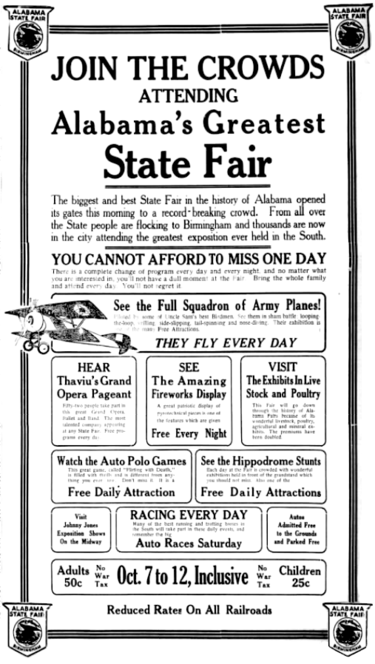1918 Alabama State Fair
The 1918 Alabama State Fair was a State Fair scheduled to be held from October 7 to October 12, 1918 at the Alabama State Fairgrounds in Birmingham. The ongoing involvement in the Great War was not expected to affect the success of the fair, the celebration of which was endorsed by President Wilson's administration. Due, however, to the rapid arrival of the 1918 influenza pandemic, the fair, along with all schools, theaters, churches and public assemblies, were closed by order of the Birmingham City Commission on the evening of October 8.
The fair was organized by the Alabama State Fair Association, led by chairman Robert Brown, and managed by Secretary J. L. Dent. More than $15,000 was spent in advance of the fair to improve the grounds. A new entranceway and offices were constructed, along with a Birmingham Kennel Club building, and a new poultry exhibition building. The grandstands were also enlarged and the automobile and machinery exhibition halls were enlarged.
Advance season passes for the fair went on sale on September 16 for $2, and daily tickets were sold at 50¢ each, with children admitted for half price, with "No War Tax". There was no charge to park automobiles at the fairgrounds. The opening Monday was designated as "Children's Day". The schools were let out, admission was set at 15¢, and a special children's grandstand program was held.
The fair featured large displays of livestock, produce and other farm and industrial products brought from various county fairs and Chambers of Commerce. The Birmingham News also sponsored a "Healthy Baby" contest with prizes for the best specimens of humans aged 3 to 36 months. The fair's midway was furnished by the Johnny J. Jones Exposition. A daily air show was staged by U.S. Army Air Service aviators from Payne Field in West Point, Mississippi, including Birmingham native Jack Heard. The squadron was to demonstrate various stunts, and recreate aerial combat between American flyers and a "German" airplane emblazoned with a black cross. The air maneuvers continued despite the eventual shutdown of the fair, with various stunts viewed from the downtown area, Norwood, Red Mountain and the "industrial sections" of the city.
Feature attractions included five full programs of horse races conducted under the rules of the Kentucky State Racing Commission followed by a "Big Automobile Race" on the final day. Other grandstand attractions included the first staging of an "Auto Polo" match in the South, promising, "thrills, excitement, a game with eternity;" and "Thaviu's Grand Opera Pageant" combining orchestra, ballet and grand opera with a company of 52 people on stage each night. The conclusion of each night's entertainment was followed by "patriotic fireworks."
Even before it was forced to close down, the fair board had undertaken special measures to try to limit the spread of the influenza virus. The grounds were "sprinkled" with a disinfectant solution, and an on-site hospital was set up. Initially the only two patients to seek medical treatment appeared to be affected by over-consumption of candy and by being struck by a falling tent-pole. On the second day, however, a number of nurses were summoned to the fairgrounds to respond to a group of fairgoers falling suddenly ill. Unaware of the fair's closure, visitors continued to arrive in Birmingham by train and were observed to be, "wandering aimlessly up and down the streets" until their return trip.
With the public fair canceled, the board arranged for judging of exhibits to be completed and prizes awarded, as well as for all advance tickets to be refunded. The estimated $29,500 loss was borne by the "merchants and business men of the community," who held shares of and bonds issued by the State Fair Association. A separate committee made up of civic leaders issued an appeal to the public to voluntarily contribute to offset those losses. Meanwhile the directors immediately began planning for the 1919 Alabama State Fair, which they promised would, "eclipse any similar exposition ever given south of the Ohio."
References
- "Alabama State Fair Grounds Improvements Representing an Expenditure of About $15,000." (August 10, 1918) The Birmingham News, p. 7
- "Race Will Be Run for Alabama Fair." (September 20, 1918) The Birmingham News, p. 9
- "Yank Airman to Down Hun Here: Complete Squadron of U.S. Planes Planned for State Fair." (September 30, 1918) The Birmingham News, p. 7
- "Influenza Causes Deaths Here; Big Closing Possible." (October 6, 1918) The Birmingham News, p. 1
- "Every Obligation of State Fair Will Be Met by the Guarantors." (October 9, 1918) The Birmingham News, p. 11
- "Public-Spirited Citizens Called To Help Bear State Fair Burdens." (October 13, 1918) The Birmingham News, p. 8
- Vance, Henry (October 16, 1918) "Miss Elma Moore, 797 Pound 'Fat Girl,' Dies of the Influenza." The Birmingham News, p. 11
